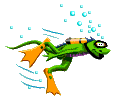 |
Scuba Training Subjects for Students |
 |
 |
Scuba Training Subjects for Students |
 |
Directory to Scuba Subjects for Students |
||||||||||||
|
As always with Scuba Diver's, you are responsible for yourself, use at your own risk! (We take no responsibility for this information).
|
Location |
Elevation |
| Denver Colorado | 5,280 feet |
| Fort Collins, Colorado | 5,003 feet |
| Monument, Colorado | 7,352 feet |
| Raton Pass, New Mexico | 7,834 feet |
| Santa Rosa, New Mexico | 4,300 feet |
| Sterling, Colorado | 3,939 feet |
Consider this problem: You live in Denver and are spending the weekend diving in Santa Rosa, New Mexico. What do you use for altitude when doing your 'altitude adjustment', if you are traveling by auto. We recommend that you use the highest elevation you could possibly be at during your 24 hour post dive period. Therefore we suggest you use 7,834 feet (or 8000'). Since you must go over Raton Pass on your return trip. If something comes up, and you need to return home early, you could feel confident that you are within the guidelines of the tables. This is one of the big reasons that we prefer dive computers that allow a diver to manually set the altitude range for the computer. A real must for inland divers.
Mail order Scuba Equipment
We don't recommend buying mail order, unless you know exactly what your getting, but at the least its a good way of comparing prices with the dive centers. You should buy locally when possible, after all, its your local dive shops that support you: doing service, tank refills, group trips, and providing instruction. The retail business of these local shops is there bread and butter. In most cases there is little to no profit from the Instruction and group trips.
Divers Direct, or call 1-800-dive-usa for catalog or to order.
Divers Supply We've visited the Palm Beach, Florida location and found the staff to be friendly and knowledgeable. Very competitive. Check them out.
Wet Suit Repair
StitchLines
3750 South Broadway
Englewood, CO.
303-781-9044
Phyllis does the best custom wet suit modifications and repairs that you will find anywhere. Her rates are more than reasonable. We have heard nothing but praise from everyone that has used her services. We've had zippers added to our arms and legs in all our new wet suits. She has modified and repaired our older wet suits. We recommend her to anyone. Call for up to date prices and directions. Tell her you heard about StitchLines from our Web site.
Student Information for Open Water and Advanced O.W. Certification Dives
As part of your dive education/experience, we require you plan and bring everything you will need for your scuba weekend. This includes the following:
*Note: We will bring a few extra weights to ‘fine’ tune your buoyancy once we are there.
We suggest you get any equipment you need at least 1 to 2 days before the trip from the Dive Shop. There is no extra cost for using the Shops tanks, regulators, BCD, compass, and 1/4" wet suit. But you must remember to pick them up.
Please make sure you return your rental equipment the NEXT day. Also, before returning rental gear, make sure your equipment has been rinsed in clean fresh water. Let it hang dry, remember not to dry any wet suit in direct sun light to avoid damage. This will avoid any additional charges.
Notes on Purchasing Scuba Equipment, etc.
As always with Scuba Diver's, you are responsible for yourself, use at your own risk! (We take no responsibility for this information).
When a new Diver on a budget asks for help in selecting equipment, this is the approximate order of equipment we would recommend they invest in. As with most things, you usually get what you pay for. It would be wiser to buy a good mask, snorkel, and fins and have to wait before buying more equipment. Purchasing cheap equipment, only to turn around and replace it later, saves nothing. Always buy name brand, check the warranties. Never buy regulators, BCD's, camera's, etc. that cannot be serviced. If a deal looks to good to be true, BEWARE!
Pay attention to the equipment you rent and take note of the things you like or don't like about it. This can be invaluable when selecting your own equipment.
Of course not everyone needs all these things! Depending on your diving plans, interests, and budget. Many divers never purchase anything past the first 10 items noted above. For the occasional diver, this makes good sense. Most of the other items can be rented when needed. If you dive at least once a year, and plan to keep diving, purchasing your own equipment can save a substantial amount of money over a life time of diving.
Every Scuba shop we know usually starts selling there rental equipment off starting about Nov. through Feb. You can pick up a reasonable Regulator and BCD for about $150 to $700 dollars for the set. This is a huge savings over new equipment. If you ask, you may find your instructor or dive master willing to sell off equipment also. Due to there store discounts, they usually buy new equipment every year or so and sell off there older equipment. This is usually much better equipment than you'll find in the used rentals.
Return